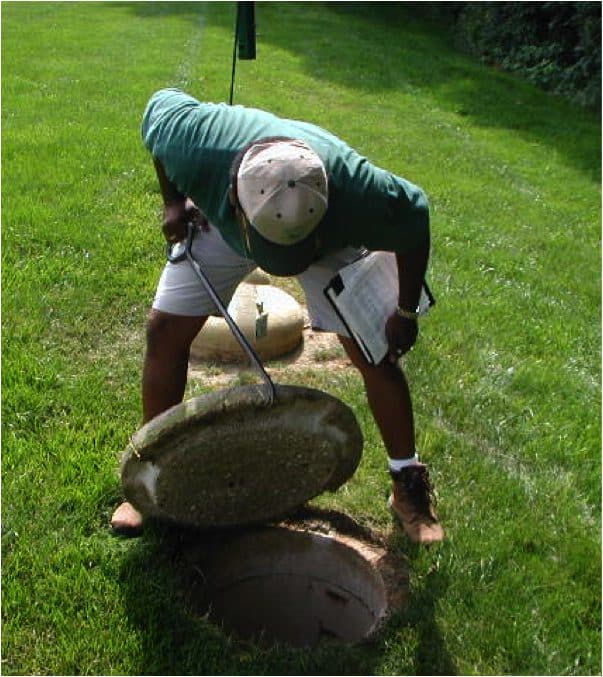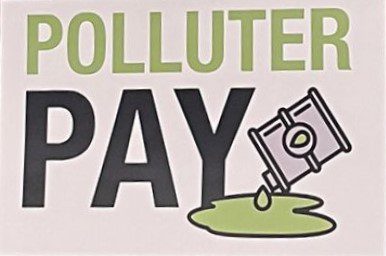Our Legislative Corner is where you can find information on environmental bills introduced in Michigan’s State Capitol, located in Lansing, that would impact Michigan’s lakes, streams, rivers, wetlands, and groundwater. Below you will find a concise summary of bills in the Michigan Legislature, any concerns or positions we have, and links to the text of the bill.
If you have questions about any bills or the status of particular legislation, please email our Policy and Advocacy staff.
Statewide Septic Code
House Bills 4479 and 4480, Introduced 4/27/2023, Referred to the House Committee on Natural Resources, Environment, Tourism and Outdoor Recreation
Senate Bills 299 and 300, Introduced on 4/27/2023, Referred to the Senate Committee on Energy and Environment
At least a third of these septic systems are not working properly, potentially leaking billions of gallons of human waste onto our properties, into our lakes and streams, and into our drinking water. This is because Michigan is the only state in the nation that lacks a statewide septic code, which sets minimum standards for construction, operation, and maintenance. These bills would make it so all septic systems are periodically inspected and, if failing, fixed. Additionally, a database on inspections would be created, an inspector certification system would launch, and a technical advisory committee on onsite wastewater treatment would be created to advise the Department of Environment, Great Lakes and Energy on recommended standards for the management of septic systems.

Sand and Gravel Mining Oversight
House Bills 4526, 4527 and 4528, Introduced 5/04/2023, Referred to the House Committee on Regulatory Reform
These bills would transfer permitting and oversight of sand and gravel mines from local governments to the state. Under the legislation, the Michigan Department of Environment, Great Lakes and Energy (EGLE) would assume permitting authority over aggregates. Specifically, it would amend the Michigan Zoning Enabling Act to prohibit a county or township from regulating or controlling aggregate mining and specify that the county or township would not have jurisdiction over the issuance of a permit, approval, or other authorization for the location, operation, abandonment, or reclamation of an aggregate mine unless certain conditions were met.

Tip of the Mitt Watershed Council has a long history of working collaboratively with local units of government and mining companies to identify ways in which companies can effectively mine for aggregates while protecting water resources and the local community. While the bills introduced prescribe a number of requirements that sand and gravel mining companies must meet, it fails to allow for local governments or the Michigan Department of Environment, Great Lakes, and Energy to address all of the concerns that come with mining operations, such as invasive species management. In addition, it fails to allow local community concerns to be adequately addressed, such as requiring the testing of nearby drinking water wells or increasing setbacks. Provisions are not included to allow for modifications and conditions to be made to permits based upon feedback provided during the public comment period.
Based on the Watershed Council’s history and experience, it is far better to engage in productive, proactive dialogue with community members, mining operators, and local units of government to find a solution that serves not only the needs of the gravel or sand operation, but also protects the welfare, character, and environment of the local community. This can only happen when local government, on behalf of those directly affected, is involved and retains control over the process.
Repeal Polluter Panels
Senate Bills 393 and 394, Introduced 6/15/2023, Referred to Senate Committee on Regulatory Affairs
These bills would repeal the Environmental Permit Review Commission (EPRC) created under former Governor Snyder’s tenure.
The Environmental Permit Review Committee (ERPC) hears two types of appeals: petitions for application review when a permit applicant has a dispute with the Michigan Department of Environment, Great Lakes and Energy (EGLE) while their permit application is pending, and reviewing the decisions of administrative law judges made on a permit.
The ERPC is considered to be ineffective, cause delays, be an expensive use of taxpayer dollars, and be redundant to government processes already in place. As a result, repealing the ERPC would streamline the permitting process in Michigan bettering serving the needs of the citizens of Michigan.

House Bills 4824, 4825, and 4826, Introduced 6/15/2023, Referred to House Committee on Natural Resources, Environment, Tourism and Outdoor Recreation
These bills would eliminate the Environmental Rules Review Committee (ERRC), also enacted by former Gov. Rick Snyder in 2018. While the panel was created to allow stakeholder input and engagement in EGLE’s rulemaking, it has acted as a barrier to efficient government operation. Primarily because it allows industry to review environmental regulations that will be imposed on them. Six members of the 11-person board must represent the industries regulated by EGLE. Under the current Administrative Procedures Act, there are opportunities for stakeholder engagement and input including hearings, public comment, and the process before the Joint Committee on Administrative Rules. The ERRC is duplicative, costly, and has served to significantly delay implementation of rules designed to protect Michigan’s environment and water resources.
Polluter Pay Package
Senate Bills 605-611, Introduced on 10/25/2023, Referred to the Senate Committee on Energy and Environment
House Bills 5241-5247, Introduced on 10/25/2023, Referred to the House Committee on Natural Resources, Environment, Tourism, and Outdoor Recreation
From 1990 until 1995, Michigan had the strongest “polluter pay” law in the country. If a corporation was responsible for contaminating our land, air, or water, that corporation was also responsible for cleaning it up, not taxpayers. In 1995 the administration of former Governor John Engler significantly narrowed the polluter pay law, and funding for environmental cleanups in Michigan has suffered ever since.

Michigan now has more than 24,00 properties known to be polluted, with roughly half of them so-called orphan sites, which means they couldn’t be tied to polluters because they are no longer in business, bankrupt, unfindable or otherwise able to escape liability – meaning taxpayers will be responsible for covering the cost of cleaning those sites. The properties range from old dry cleaners and gas stations to former automotive factories and industrial suppliers, tanneries, chemical plants, military bases and more.
The legislation in the Polluter Pay package includes:
- Senate Bill 605 would require landowners to alert regulators when they find pollution, and would give state regulators more authority over cleanup plans.
- Senate Bill 606 would no longer allow landowners to avoid cleanups by simply containing pollution (such as by capping soil under a parking lot). Instead, they’ll be required to bring their properties up to residential land use or drinking water standards, wherever “technically feasible.”
- Senate Bill 607 would expand state environmental regulators’ authority to set cleanup criteria, allowing officials to avoid a lengthy rulemaking process.
- Senate Bill 608 would require some industries to post bonds or hold insurance to cover cleanups in the event that they pollute. Today, taxpayers are often stuck with the cleanup costs after polluting companies go bankrupt.
- Senate Bills 609 and 611 would make it easier for the state and private citizens to sue polluters, by adjusting the statute of limitations on claims.
- Senate Bill 610 would allow people exposed to high levels of hazardous substances to sue the responsible party for the cost of medical monitoring, without waiting until they’ve been diagnosed with a disease.
Repeal Ban on Plastic Bags
House Bill 4359, Introduced 5/09/2023, Referred to House Committee on Government Operations
Senate Bill 228, Introduced on 3/22/2023 , Referred to Senate Committee on Energy and Environment
In 2016, former Governor Rick Snyder signed a law to ban local governments in Michigan from banning plastic bags. These bills would repeal the 2016 state law preventing local municipalities from banning the use of disposable plastic bags and containers. By repealing the act, a local unit of government would be permitted to adopt an ordinance that regulates and/or imposes fees, charges, or taxes on auxiliary containers. Though the term “auxiliary containers” includes items like cups and bottles made from a host of materials – such as aluminum, glass, plastic or cardboard.

This bill is vital because the state’s Michigan Water Stewardship Program estimates that roughly 80 percent of litter on the Great Lakes’ shoreline is plastic with Lake Michigan seeing the highest level of plastic pollution entering it at 5,000 metric tons per year. Nearly 22 million pounds of plastic debris enter the Great Lakes each year.
Another 10 states have outright banned single-use plastic bags including Washington, California, Oregon, Hawaii and Delaware. According to a study from the University of Sydney, California’s plastic bag ban reduced the consumption of plastic bags by 71.5%.
Filter First
Public Act 154, Effective 10/19/2023
Public Act 155, Effective 10/19/2023
Governor Whitmer signed a package of bills to filter and test drinking water for lead in schools and child care centers to ensure children have access to safe drinking water. The “filter first” bills will implement the Clean Drinking Water Act and require Michigan schools and childcare centers to install filtered-faucets and develop a drinking water management plan. Regular water sampling and testing would also be required, and the state would inspect child care centers once every two years. Training will be provided to child care staff to implement filtering plans, and the state environment department will provide guidance.

Lead is an extremely dangerous toxin to childhood development. Poisoning can cause behavioral and learning problems and medical issues like anemia and seizures. These efforts come nearly a decade after the Flint water crisis began.
In 2022, the legislature approved funding in the state budget to help offset the costs of implementing these bills. According to a nonpartisan, it would collectively cost schools and daycares about $65 million to install and maintain filtered water stations (not counting any existing ones). This is still less expensive, is more effective and puts protection in place more quickly than waiting on a water utility to replace lead service lines.
“No Stricter than Federal” Repeal
Public Act 14, Effective 7/27/2023
Gov. Gretchen Whitmer signed legislation repealing the state’s “no stricter than federal” law, passed at the end of Gov. Rick Snyder’s tenure. The “no stricter than federal” law prohibited state agencies from making rules stricter than federal standards unless they established “that there was a clear and convincing need to exceed the Federal standard.” The “clear and convincing evidence” standard that currently exists is considered the second-highest standard in any legal setting, just behind the criminal conviction standard of “beyond a reasonable doubt.”
Federal regulations are intended to be the lowest standard that states must meet — the floor that states cannot go below. Michigan has in numerous instances justifiably, and with benefits for all residents, gone above and beyond the federal minimum. In 1976, Governor Milliken issued a rule that limited the amount of phosphorus flowing into Lake Erie at a time when algae blooms threatened the survival of the Lake and the legislature was taking no action. His requirements were stricter than existing federal standards and they are credited with saving the Lake. In the wake of the Flint crisis, Michigan adopted tighter rules on lead and copper in water. These changes make Michigan’s standards for eliminating lead not only tougher than any other state, but the regulations are more stringent than federal standards. Frustrated with the federal inaction as Michigan endured a PFAS contamination crisis, state officials in 2020 enacted their own drinking water standards. At the time, they were among the nation’s strictest.
With the repeal, state agencies once again have the flexibility they need to develop a regulatory structure that fits Michigan’s unique natural resources rather than defer critical decisions about the protection of our natural resources and public health to the federal government.


